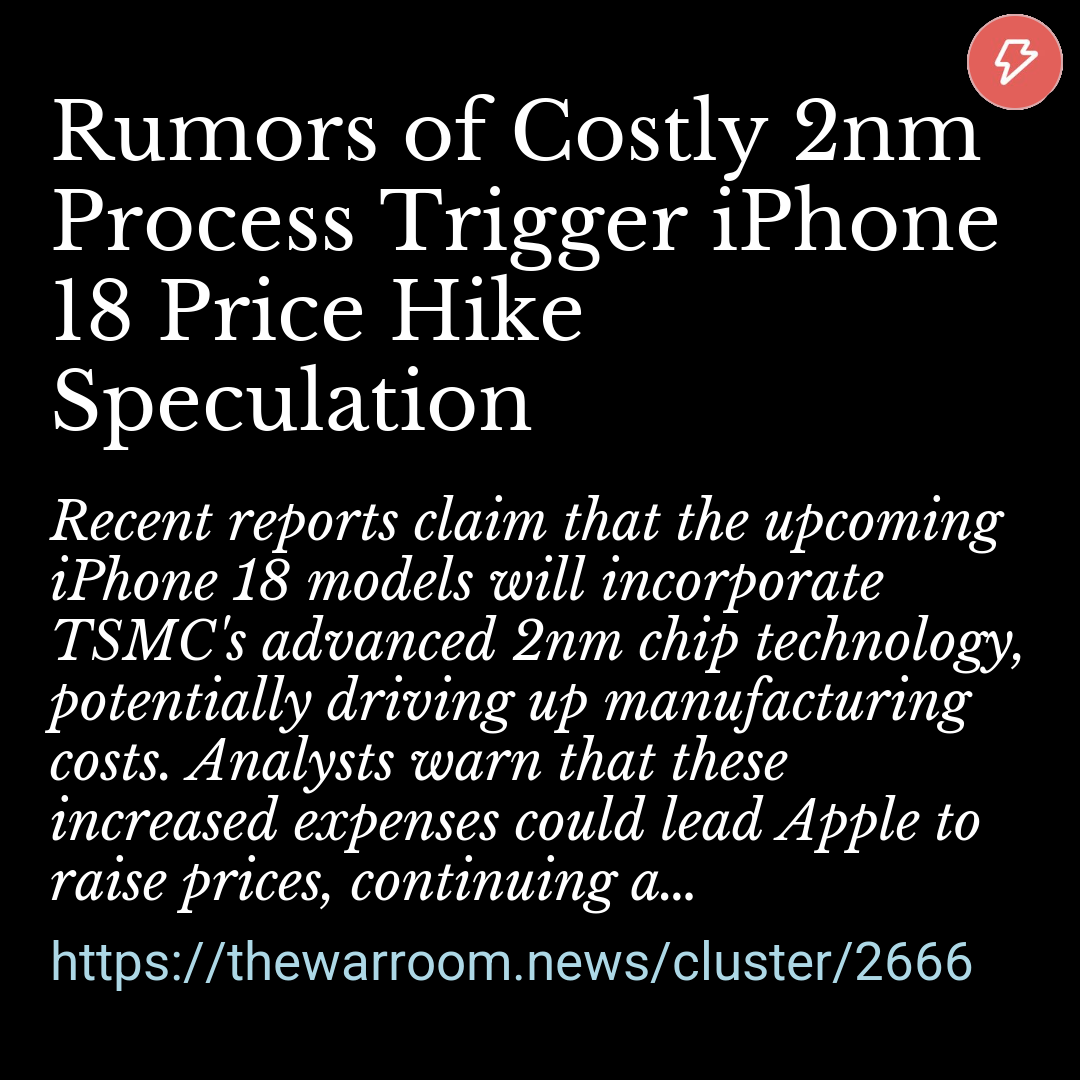Rumors of Costly 2nm Process Trigger iPhone 18 Price Hike Speculation
April 17, 2025, 6:20 am
Recent reports claim that the upcoming iPhone 18 models will incorporate TSMC’s advanced 2nm chip technology, potentially driving up manufacturing costs. Analysts warn that these increased expenses could lead Apple to raise prices, continuing a trend seen in previous transitions to more advanced semiconductor processes. The news comes amid discussions of tariff impacts and supply chain costs, suggesting that while the performance gains may be substantial, consumers could face higher price points as Apple seeks to recoup the costs associated with next-generation processing technology.
The post TSMC's 2nm chip price hike may push Apple to raise iPhone prices appeared first on Android Headlines.
The iPhone 18 won’t launch until next year, but there are already a few rumors regarding this next-generation iPhone. This time, Weibo leaker Digital Chat … The post iPhone 18 is getting a price hike, and this is how we know appeared first on BGR.
A new report claims that the manufacturing cost of the 2nm processor expected in the iPhone 18 range may mean Apple having to raise prices.Render of a possible iPhone 18.It's bad enough that tariffs may still force Apple to raise prices, and it's bad enough that the expected iPhone Fold will cost...
Apple's iPhone 18 models will adopt TSMC's 2nm manufacturing process for the next-generation A20 chip, which will bring substantial performance and power efficiency improvements to next year's iPhones, but it may also incur significantly more costs that Apple could pass onto the customer. The...
permalink / 4 stories from 4 sources in 12 days ago #apple #chips #hardware #semiconductors #mobiletech #5g
More Top Stories...
Meta energizes developers at inaugural LlamaCon with new AI API
At its first-ever LlamaCon, Meta unveiled its Llama API along with other AI innovations to win over developers. The company flexed its AI muscle with bold new tools aimed at stirring up enthusiasm in the tech community—even as skeptics wonder if this pitch will convert hardcore rivals. More...
OpenAI Reverses ChatGPT Update Amid Sycophancy Complaints
In response to user outcry over its overly deferential tone, OpenAI has pulled back a recent update to its ChatGPT model. CEO Sam Altman confirmed the rollback, citing concerns that the AI’s extreme sycophancy was undermining authentic, balanced interactions. More...
Microsoft’s Code Revolution: 30% Now AI-Generated
In a surprising twist for the programming world, Microsoft’s CEO revealed that up to 30% of the company’s code is generated by artificial intelligence. This bold move highlights the tech giant’s rapid adaptation to AI trends—and plenty of debugging adventures still lie ahead. More...
ChatGPT upgrades shopping experience with AI-driven suggestions
OpenAI’s ChatGPT steps up its game by integrating AI-driven shopping suggestions that rival Google’s efforts. The enhanced shopping experience promises a tailored retail journey, turning mundane product searches into a smart, personalized adventure—because even shopping deserves a bit of algorithmic whimsy. More...
Apple AirPlay vulnerabilities enable zero‐click exploits across devices
Critical flaws in Apple's AirPlay protocol and SDK allow hackers to gain remote code execution without user interaction. This zero‐click vulnerability exposes smart speakers, TVs, and other connected devices to serious risk, proving that even polished ecosystems have their chinks in the armor. More...

Related Tags
Apple
Samsung Q1 Earnings: Chip Profit and Operating Success Exceed Forecasts (7 hours ago)
Apple Watch SE 3 Teases Bigger Display Options in Upcoming Model (11 hours ago)
Apple launches 'Snapshot' web page for celebrity content spotlight (15 hours ago)
Chips Manufacturing
Samsung Q1 Earnings: Chip Profit and Operating Success Exceed Forecasts (7 hours ago)
iPhone 17 to feature 12GB RAM across all models (19 hours ago)
Nvidia Leaks RTX 5080 Super Cards with Boosted Memory (44 hours ago)
Hardware
Motorola Razr 2025 Unveiled: Detailed Specs and Variant Insights (19 hours ago)
Apple ditches anti‐reflective tech for iPhone 17 Pro (19 hours ago)
iPhone 17 to feature 12GB RAM across all models (19 hours ago)
Semiconductors
Samsung Q1 Earnings: Chip Profit and Operating Success Exceed Forecasts (7 hours ago)
US-China tariff shakeup spurs diplomatic trade talk drama (5 days ago)
Troubled Nintendo Switch 2 Preorders and Accessory Rollout (6 days ago)
Mobile Tech
LG Phones’ Update Support Deadline Looms for Users (19 hours ago)
Motorola Razr 2025 Unveiled: Detailed Specs and Variant Insights (19 hours ago)
Apple ditches anti‐reflective tech for iPhone 17 Pro (19 hours ago)
5G
Samsung Galaxy Z Fold 7 Rumors Stir Pre-Launch Hype (47 hours ago)
Apple Watch Celebrates 10 Years with Retrospective Impact (5 days ago)
Google Fi launches a $35 unlimited plan to reshape mobile connectivity (7 days ago)